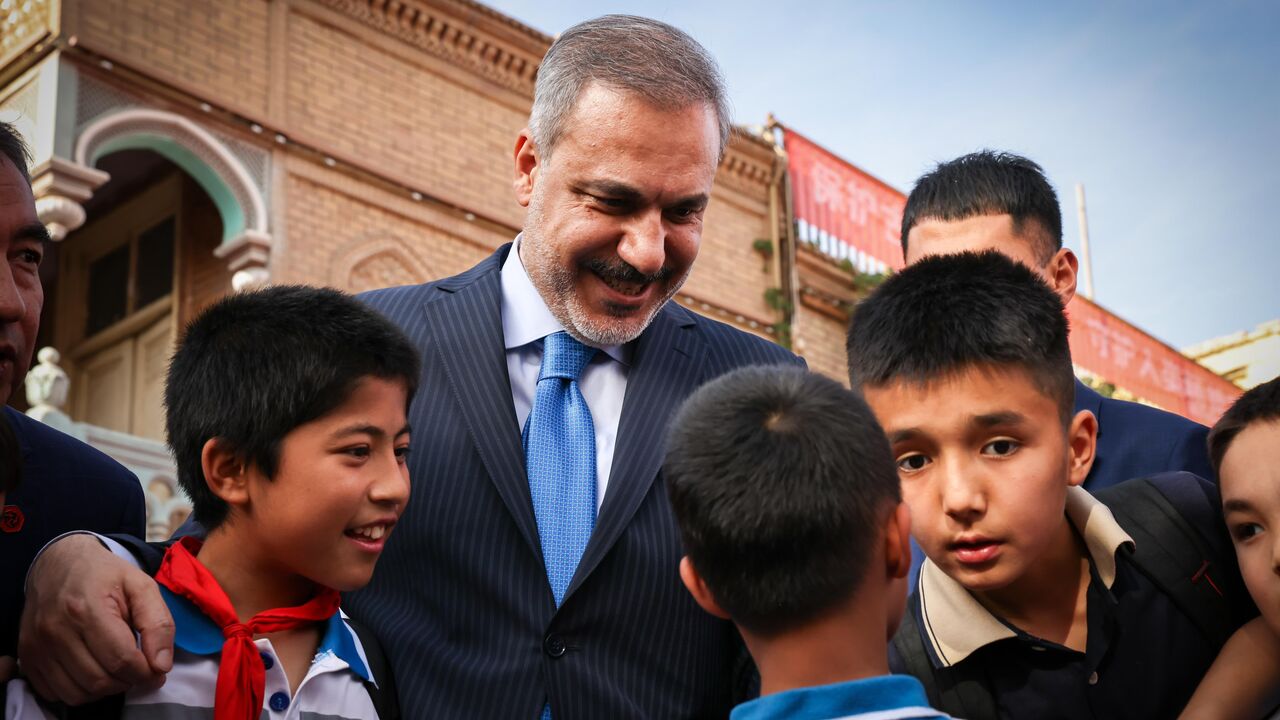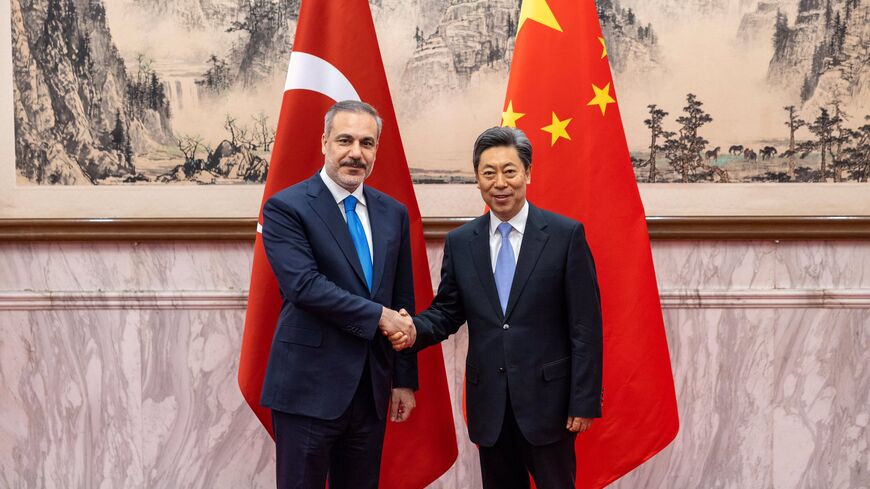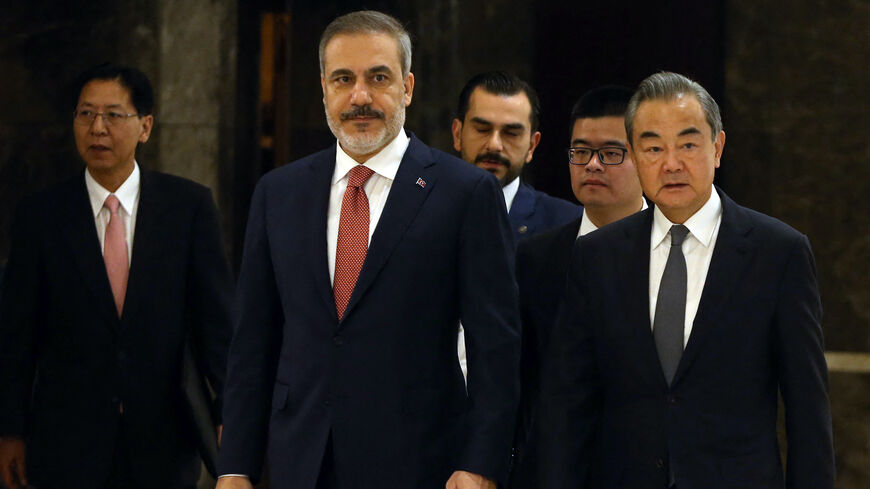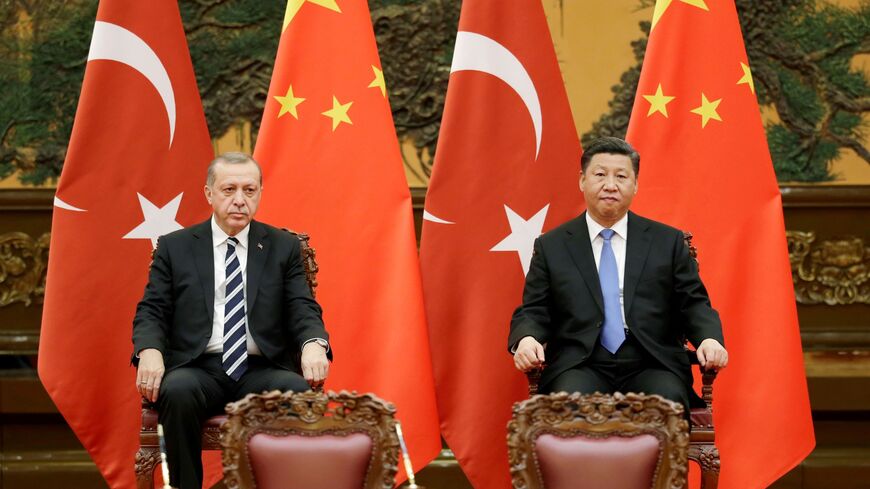Have Turkey, China hit reset button on Uyghurs as Fidan visits Xinjiang?
Experts say Beijing and Ankara skillfully managed the contentious Uyghur issue during the Turkish diplomat's China visit, but Fidan's messages might raise eyebrows in the West.

ANKARA — Turkish Foreign Minister Hakan Fidan’s visit to China marked an important turning point in Turkey-China ties amid a display of joint desire for closer relations —disagreements notwithstanding — but some of the rhetoric during the trip raised eyebrows in the West.
Fidan ended his three-day official visit to China on Wednesday in the Xinjiang Uyghur Autonomous Region in northwest China after holding talks with Chinese officials in Beijing, including his counterpart, Wang Yi, as well as Vice President Han Zheng on Monday and Tuesday.
Wearing a blue tie the same shade as the blue-white East Turkestan Uyghur flag, Fidan met with local officials and walked down the streets of the region's capital, Urumqi, and Kashgar.
His outfit choice on Wednesday seemed like an effort on Fidan’s part to send a symbolic message to the Uyghur community in Turkey — one of the largest and most vocal Uyghur diasporas in the world — and to the broader international public that Ankara’s ties with Beijing wouldn’t come at the expense of China’s largest Muslim minority.
Turkey is home to around 100,000 Uyghurs, a Muslim minority of Turkic origin who lives primarily in China’s Xinjiang region. Human rights organizations have repeatedly pointed to a campaign of repression by China against the Uyghur community.
The international community accuses Beijing of mass oppression of Uyghurs through incarcerating tens of thousands in a bid to strip them of their Muslim identity. The issue, which tops the list of bilateral differences between Ankara and Beijing, led to a major escalation between the two capitals in 2019, when Turkey brought the minority's plight up at the United Nations, condemning Beijing for “torturing” more than a million Uyghurs.
But all appeared reconcilable as Fidan met with his Chinese hosts. Still, the top Turkish diplomat stopped short of referring to the autonomous region by its Chinese name “Xinjiang,” instead describing the two cities as “historically Turkic Muslim” cities.
Through these subtle messages, Fidan was also diplomatically calling on Beijing to revisit its Uyghur policies, according to Nurettin Akcay, a Turkish academic at Ankara’s Yildirim Beyazit University who received his PhD at Shanghai University in Turkey-China ties.
“The message which is being signaled is that Turkey wants to improve its relations with Beijing. It also respects China's territorial integrity and sensitivities,” Akcay told Al-Monitor. “However, China also has to pay attention to Turkey's sensitivities. China should be more careful in its policies toward the Uyghurs.”
Mutual maturity
Fidan’s description of Urumqi and Kashgar as “historically Turkic Muslim" cities ruffled some feathers in China, according to Akcay, but “the Chinese side hasn't expressed their disgruntlement publicly because they do not want to escalate the issue to a level that could damage the ties.”
Sibel Karabel, the head of the Southeast Asian Countries Strategic Studies and Research Center at Istanbul's Gedik University, concurred. “This issue was almost a taboo between the two sides,” she told Al-Monitor. “I believe that it was handled with great maturity from both sides.”
The successful compartmentalization, in turn, could lay the foundation for closer Turkey-China ties. “I'm fascinated by the Urumqi Kashgar leg of the visit,” Soner Cagaptay, director of the Turkish research program at the Washington Institute for Near East Policy, told Al-Monitor. “It didn't look like Fidan was able to address the persecution that the Uyghurs are facing. So perhaps that is big enough for now for the Chinese to get from Turkey.”
“Considering the difference between the two countries, it's a baby step toward Turkey and China ever establishing what I would call a great power, middle power kind of relationship.”
China also has reasons to push for closer ties with Turkey. “It is a time when China also needs to diversify its investments,” Karabel said.
China’s investments in Europe have drastically decreased over the past years, largely due to increasing Western scrutiny and restrictions against Chinese companies.
Turkey, located at a juncture between Europe and the Middle East, provides opportunities for China’s Belt and Road initiative, according to Karabel.
Fidan’s visit to China marked the first of its kind since his predecessor, Mevlut Cavusoglu, visited the Asian powerhouse in 2022, and his trip to Xinjiang marked another first since Turkish President Recep Tayyip Erdogan’s visit there in 2012 as then prime minister.
Cavusoglu blasted Beijing last year for dictating terms for the Turkish ambassador’s request to visit Xinjiang: “Why would we be a tool of Chinese propaganda?” the then top Turkish diplomat snapped. But after Erdogan’s victory in the May 2023 presidential and parliamentary elections, Ankara moved on to foreign policy restoration and shifted to more constructive diplomacy largely aimed at attracting investments to its ailing economy. The country’s annual inflation hit more than 75% last month.
China is the third-largest trade partner of Turkey, with the two countries' trade volume exceeding $47 billion last year; Turkish exports to the Asian powerhouse stood at a meager $3 billion. The measures aimed at easing the imbalance were one of the top issues discussed in the Fidan-Wang meeting, the Turkish foreign minister said during the joint presser.
Ankara seeks more direct Chinese investments in Turkey as well as the lifting of restrictions on Turkish agricultural exports to China. “We particularly would like to focus on cooperation in the energy field,” Fidan said.
His visit comes a week after Turkish Energy Minister Alparslan Bayraktar's visit to the global power. Speaking after the visit, Bayraktar said the two countries were close to a deal on a new nuclear plant. In addition to the Russian-built Akkuyu Nuclear Power Plant in Turkey’s southeast, Ankara is in talks with Russia and China for the country’s second and third nuclear power plants.
Echoing Xi, ruffling feathers in Washington
Fidan also lashed out at the West during the visit, using China's rhetoric of empowering the Global South.
In remarks echoing Chinese President Xi Jinping’s oft-repeated line of “common prosperity,” Fidan said, “There is enough prosperity for everyone in our world.”
“The markets established by the dominant powers in the previous century are changing hands again under more fair and competitive market conditions; this is a result that must be acknowledged,” he went on.
The remarks were in contrast with Ankara’s efforts to rebuild trust with Washington after turbulent years and a positive momentum in Turkey-US ties following the Turkish nod to Sweden’s NATO membership in January.
But according to Alper Coskun, a retired Turkish diplomat and current senior fellow at the Carnegie Endowment, Fidan’s statement, which positions NATO-member Turkey “as a party” in the conflict between the United States and China, “comes at a cost.”
“It can deepen the trust erosion between Ankara-Washington,” he told Al-Monitor. A potential Chinese undertaking of the planned nuclear power plant in Turkey stands out as another issue that will fuel questions over Ankara’s commitment to the Western alliance.
“Of course, global realities require Turkey to work with China and establish reasonable ties with Russia,” Coskun said. “But Turkey gives the impression of wobbling too much.”






